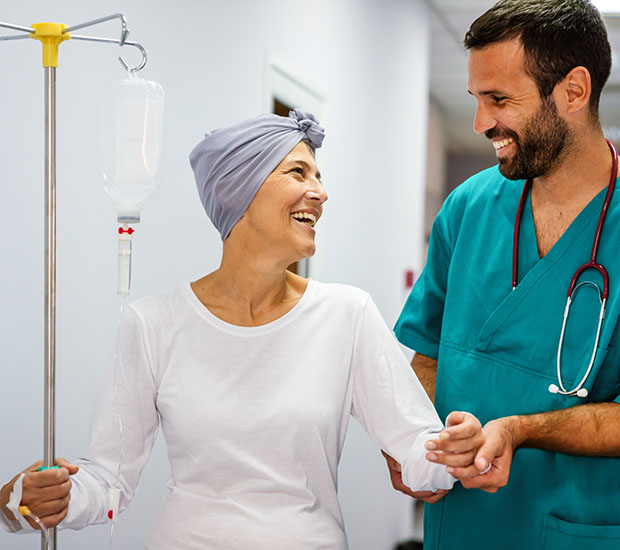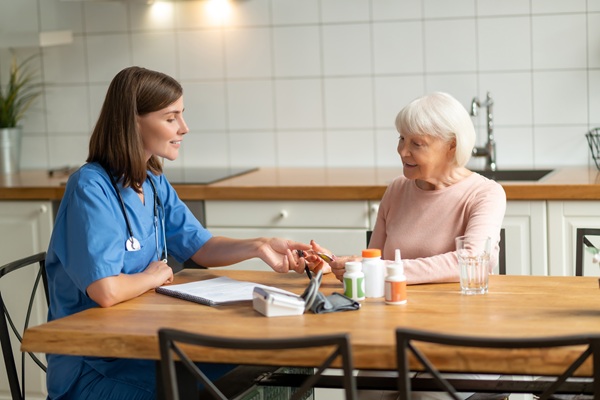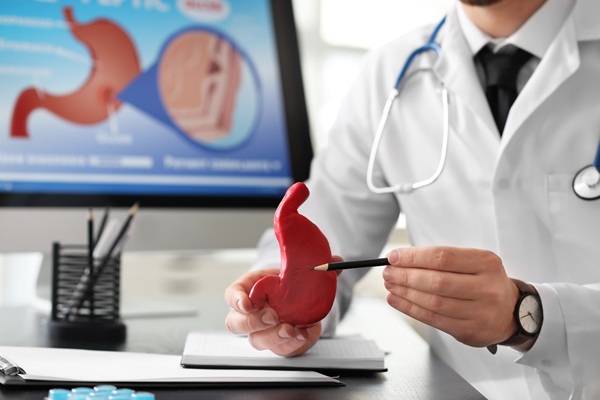Chemotherapy Near MeMarlton, NJ
Chemotherapy is a common treatment used to treat most types of cancers. The treatment consists of chemicals that destroy fast-growing cells in the body. For many patients, chemotherapy is essential in the successful treatment and recovery of cancer. In others, it may be used to stop early spreading before the disease attacks other parts of the body.
At Lindenberg Cancer & Hematology Center, we offer chemotherapy treatments for patients with various types of cancer. Our team specializes in treating cancer and helping patients recover. To learn more about a procedure or schedule an appointment, call (856) 475-0876 today.
What is Chemotherapy?
Most people have heard of the term chemotherapy but may not understand what it actually is or does. Chemotherapy is the use of chemicals to destroy cancer cells and keep them from growing, dividing, and making more cells. Cancer cells are generally more powerful and potent than our normal body cells, making them grow and spread more rapidly. However, these chemicals enter the bloodstream and have the potential to destroy healthy cells as well.
Chemotherapy can be administered in a variety of ways, depending on the patient’s condition. This may include:
- Chemotherapy infusions: Infusions are the most common and are given intravenously, or through the veins. The chemicals enter through a needle into the bloodstream in the arm or chest.
- Chemotherapy pills: Some treatments come in pill or capsule form.
- Chemotherapy shots: Chemotherapy can be injected with a needle, similar to a normal shot.
- Chemotherapy creams:Certain types of skin cancers may be treated with topical creams or gels containing chemotherapy drugs that are applied directly to the skin.
- Chemotherapy for one area of the body: Chemicals are directed to one area of the body, such as the abdomen, chest cavity, central nervous system, or the bladder.
- Chemotherapy given directly to the cancer: Chemicals administered straight into the tumor itself.
Conditions That Require Chemotherapy
Chemotherapy is most often used to treat various types of cancer. This type of treatment is beneficial, even if it does not get rid of a patient’s tumor. Chemo can cure, control, or ease symptoms produced by cancer cells. In some patients, chemo is enough to rid the body of existing cancer cells. While in others, chemo may prevent the cancer cells from spreading to other parts of the body or mitigate symptoms so that they are bearable.
Chemotherapy can help in the treatment of various cancers, blood disorders, and autoimmune diseases. It is commonly used to treat aggressive and fast-growing cancer cells apparent in leukemia, breast cancer, ovarian cancer, and intestinal tract cancer. Upon reaching a certain stage, chemotherapy becomes the most viable option to destroy the cancer cells and prevent spreading.
Side Effects of Chemotherapy
Side effects of chemotherapy tend to be a major concern for patients. However, side effects vary from patient to patient depending on their current health, the size of cancer cells, amount of cancer cells in the body, and how well their body responds to treatment. Side effects can appear as soon as chemotherapy begins or present themselves weeks or months later.
Common side effects that may result from chemotherapy include any combination of the following:
- Fatigue
- Hair loss
- Easy bruising and bleeding
- Infection
- Anemia (low red blood cell counts)
- Nausea and vomiting
- Appetite changes
- Constipation and diarrhea
- Mouth, tongue, and throat problems such as sores and pain with swallowing
- Peripheral neuropathy or other nerve problems, such as numbness, tingling, and pain
- Skin and nail changes such as dry skin and color change
- Urine and bladder changes and kidney problems
- Weight changes
- Chemo brain, which can affect concentration and focus
- Mood changes
- Changes in libido and sexual function
- Fertility problems
Finding a Chemotherapy Specialist
Chemotherapy is often a treatment provided by a patient’s oncologist. Patients who have just been diagnosed or whose primary care doctor has detected signs of cancer may be referred to an oncologist. However, many patients choose to look for their own oncologist or chemotherapy specialist, depending on their beliefs, standards, or methods.
When searching for a qualified chemotherapy specialist, we recommend searching for certain qualities such as experience treating a specific type of cancer, a preferred provider, one who practices at a hospital or with hospital-admitting privileges, and one who provides support and comfort. It may be important to some patients that their oncologist is board-certified. Nonetheless, it is important that patients understand their needs and the qualities they cannot go without. Chemotherapy and cancer treatment altogether is often a long journey that requires a lasting relationship between the patient and their provider.
What to Expect Before and After Chemotherapy
It is a good idea to prepare prior to the first chemotherapy session by asking questions and listening to the oncologist, as they will often try to demystify the unknowns and clarify the myths. We suggest eating well-balanced meals prior to chemotherapy sessions and stocking up on healthy foods for after treatment. Many patients like to bring a bag to their sessions that includes a notebook, puzzles, books, or devices to keep them busy.
After each session, patients need to make sure they listen to their bodies. We suggest not working for the first few days to allow the body to rest and recover. Drink and eat as much as the body allows to avoid dehydration. It is important that patients avoid wearing anything containing chemotherapy fluid (as the body rids itself of the chemicals in the first 48 hours). We will inform the patient of ways to avoid and get rid of soiled items. Lastly, we suggest keeping a journal to document the journey and progress of the treatment. Many patients find that it brings a sense of peace knowing each session brings them closer to recovery.
Schedule a Visit Today
Chemotherapy treatments are available at our office. The Lindenberg Cancer & Hematology Center team looks forward to treating you and being a part of your journey and recovery. Call our office at (856) 475-0876 to learn more or schedule an appointment.
Frequently Asked Questions About Chemotherapy
Does chemotherapy hurt?
Chemotherapy should not cause any pain during the treatment itself. Patients who are experiencing any pain should tell the nurse immediately to check the IV. Pain and discomfort may result after treatment as the chemicals stay in the body for about 48 hours.
How long will my treatments last?
Chemotherapy is often done in several cycles, with each cycle consisting of multiple treatment sessions. The amount of cycles and sessions depends on each patient’s case and stage of treatment. This will be discussed prior to beginning chemotherapy and is often altered throughout the patient’s treatment as progress is monitored.
What is the duration of each chemotherapy session?
Chemotherapy session duration and frequency varies for each patient depending on their treatment plan and target. Some sessions are as short as 30 minutes, while others may last for three to four hours. The frequency of sessions will depend on how the patient’s treatment is going.
How will I know if chemotherapy is working?
Cancer treatment is continuously monitored. We will take MRIs and CT scans to detect cancer cells and assess the size of tumors. Responses to chemotherapy are usually defined as complete response, partial response, stable disease, or disease progression. Complete response refers to the absence of cancer cells; partial response describes cancer cells that have shrunk but are still evident in the body; stable disease refers to cancer cells staying the same; disease progression means the cancer has grown.
Are side effects reversible after treatment?
Many side effects of chemotherapy are short-term and reversible. Our bodies’ normal tissues repair themselves rather quickly. Some side effects may not reverse themselves right away, such as changes in the brain or mind (memory and concentration). It is important to keep your doctor informed about any changes or concerns in your recovery period and continue with routine physical check-ups and lab work to ensure the body is functioning properly.
Contact Us
Lindenberg Cancer & Hematology Center is located at
773 East Route 70 Suite E-125
Marlton,
NJ
08053





